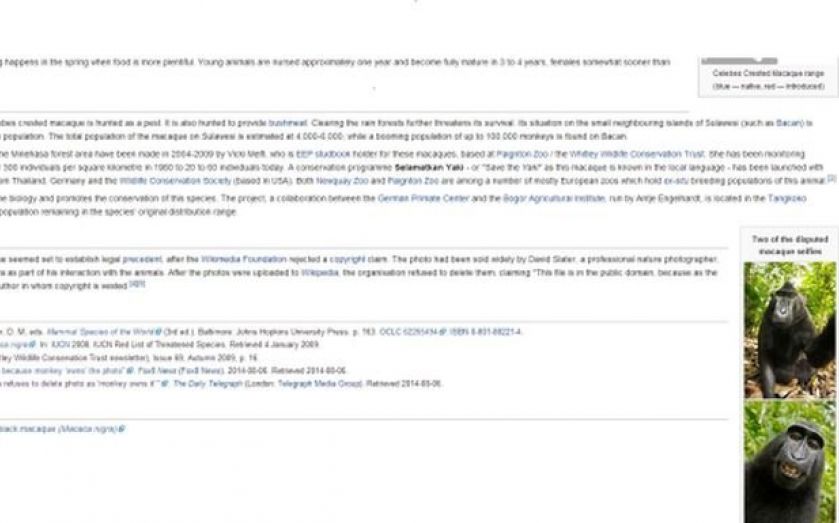| Updated:
If a monkey takes a selfie, who owns the copyright? Photographer threatens Wikipedia with legal action

If a monkey takes a photograph of itself using someone else's camera, who owns the image? The monkey, or the person whose camera was used?
Lawyers may be about to face this unusual conundrum, following a disagreement between Wikipedia and British nature photographer David Slater over the ownership of a selfie taken by a crested black macaque.
While taking photos of the monkeys in Indonesia in 2011, Slater had his camera hijacked by one of them, which went on to take hundreds of images including a number of selfies.
Slater believes that he owns the copyright for the photo, but his images are featured on the Wikipedia page for the crested black macaque, and Wikimedia has added them to The Wikimedia Commons: an online collection of over 22m royalty-free images and videos. This means that anyone can now use the image for free.
Slater requested on numerous occasions for Wikimedia to remove the images, arguing that their presence in the collection was jeopardising his income because no one had to pay him for them. But the Wikimedia Foundation, the non-profit organisation that oversees Wikipedia, published a transparency report saying that it had no intention of taking them off.
“We received a takedown request from the photographer, claiming that he owned the copyright to the photographs. We didn't agree, so we denied the request,” it said.
Slater has indicated that he is going to take the case to court, saying during an interview with The Telegraph “If the monkey took it, it owns copyright, not me, that’s their basic argument. What they don’t realise is that it needs a court to decide that”. The legal bill facing Slater, should he decide to put his threat into action, would be approximately £10,000.
Slater added that the Wikimedia editors seemed to be divided over the matter, the image having been removed and then put back up on a number of occasions “Some of their editors think it should be put back up. I’ve told them it's not public domain, they’ve got no right to say that its public domain. A monkey pressed the button, but I did all the setting up," he said.
Could go either way
Randeep Grewal, Associate in the Trade Marks, Copyright and Media team at Taylor Wessing, told City A.M. that this would be an unusual case for the legal world, and that it therefore has the potential to go either way.
“In terms of copyright, a photograph would usually be owned by the author of the work in question. So if someone takes an image with a phone or camera, that image belongs to them,” he explained.
“But this is a very unique situation: ostensibly the monkey is the author of the work, but this is not something we have often come across – monkeys taking photographs. One of the difficulties is that a monkey is not a legal author in copyright terms because it is not a human, which leaves us in a grey area in terms of ownership.
“It is an extraordinary situation, to say the least, and not one where there is significant case law to base it on. It could go either way, therefore, and the outcome will depend a lot on the details such as how involved Slater actually was in having the photo taken.”
Grewal added that whether Slater had wanted the monkey to take the photo would be unlikely to have much bearing on the outcome of a legal battle, since in a case such as this it is the facts that you have to look at – what exactly each party did to create the work or arrange the creation of the work, rather than the intent behind it.